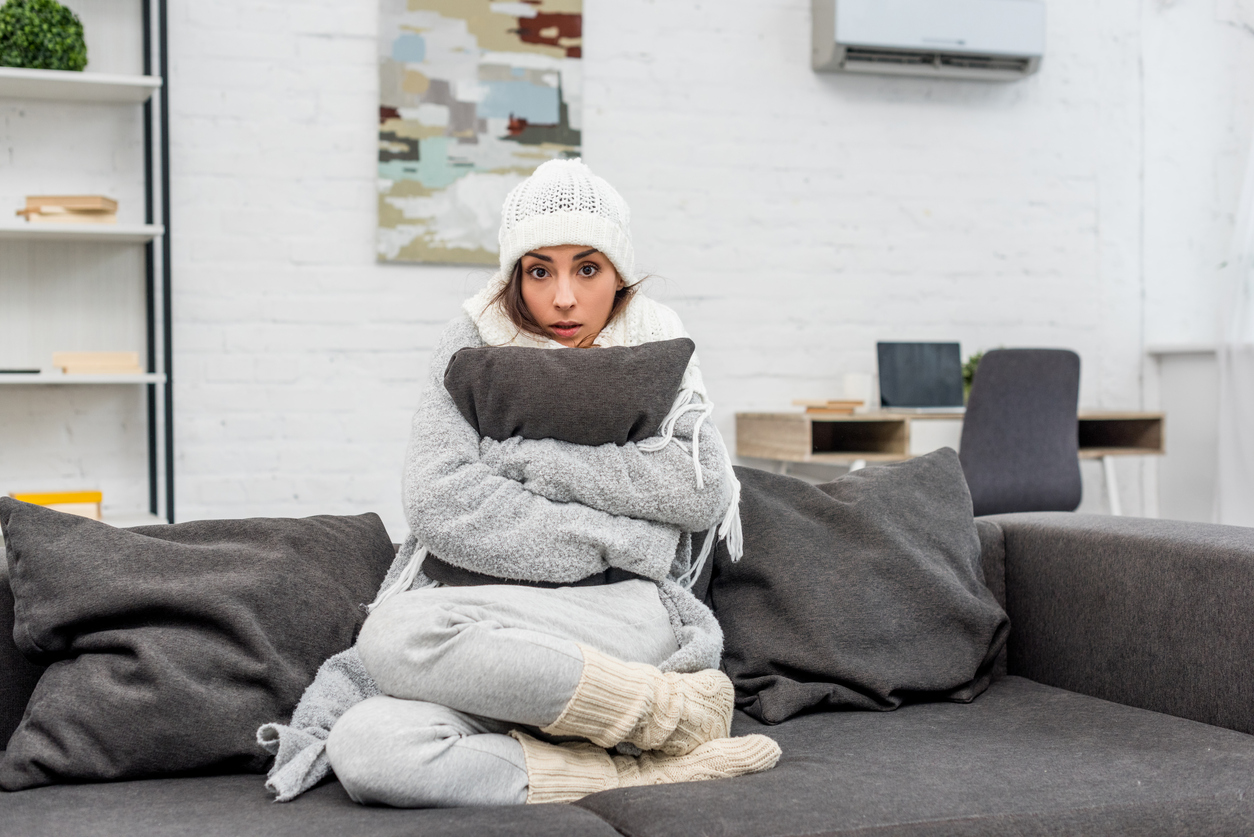Did you know that cold flashes can be a symptom of menopause?
When you think of menopause, the first symptom that comes to mind is probably the dreaded “hot flash.”
Hot flashes are the #1 most common symptom women experience as they enter perimenopause—the transitional period before menopause. Sudden, spontaneous, sweat-inducing hot flashes seem to be the hallmark of the hormonal changes associated with menopause. Yet, for some women, the menopausal journey brings an opposite (yet equally severe) symptom:
Cold flashes.
What are Cold Flashes in Menopause?
Suddenly overcome by a freezing, tingling feeling?
It could be a menopause cold flash.
Your cold flash may also be accompanied by shaking, shivering, paleness, or numbness.
While cold flashes might be considered an atypical perimenopause symptom, based on the accounts of numerous women who’ve experienced them, they may be more common than previously thought.
Both hot and cold flashes are considered menopausal vasomotor symptoms. That’s medical speak for symptoms related to your body temperature.
One of the ways your nervous system regulates your body temperature throughout the day is by dilating (opening) or constricting (closing) your blood vessels.
Closing the blood vessels (vasoconstriction) warms the body by reducing heat loss from the skin’s blood vessels. When blood vessels open (vasodilation), it cools the body by increasing heat loss from the skin’s blood vessels.
What Causes Menopause Cold Flashes and Hot Flashes?
As you enter perimenopause and menopause, your body produces less estrogen, the hormone responsible for regulating the menstrual cycle.
But that’s not all estrogen does: the hormone plays a role in metabolism, cholesterol, blood sugar levels, collagen production, bone and muscle mass, brain function (hello, inability to focus!), and …
Temperature regulation.
Researchers believe ovarian estrogen withdrawal is the trigger that leads to the oh-so-common hot flashes and less-common cold flashes.
As estrogen levels drop, the hypothalamus—the part of your brain responsible for regulating body temperature—becomes overly sensitive, leading to unstable temperature regulation.
10 Ways to Get Rid of Menopause Cold Flashes
Though less common than hot flashes, cold flashes can be just as disruptive, particularly at night. Since a good night’s sleep can be elusive during this phase of life, learning how to manage cold flashes may significantly improve the quality of your sleep.
- Limit caffeine and alcohol, as they can disrupt your sleep and influence your body’s temperature regulation system.
- Avoid sugar, spicy foods, and nicotine, which can trigger cold or hot flashes.
- Be prepared with extra clothes at work, in the car, or on hand to layer up when you experience sudden temperature changes.
- Stay active to increase blood flow and help warm up during a cold flash.
- Practice relaxation techniques, such as deep breathing or stretching, to ease anxiety and lessen the severity of stress and perimenopausal symptoms.
- Wear socks at night to keep your feet warm in the event of a cold flash.
- Adjust your diet to a hormone-balancing diet that’s rich in Vitamin C and low in sugar.
- Ask your doctor to check your Vitamin E and Magnesium levels — and supplement if needed.
- Explore herbs that balance and support hormones, such as maca root powder, red ginseng, chasteberry, St. John’s wort, or cannabis.
- Ask your doctor about bioidentical hormone therapy or prescription hormone therapy.
What Else Can Cause Cold Flashes?
Cold flashes may be a less common symptom of menopause, but that’s not the only reason you may experience a sudden onset of freezing and shivering symptoms. Cold flashes can also result from panic attacks or anxiety, which cause the release of adrenaline and other stress hormones that affect the body’s ability to regulate temperature.
While hot flashes are the most common menopause symptom, cold flashes can be equally unpleasant. It’s too bad that we can’t trade our cold flashes for hot flashes and vice versa.
If cold flashes are disrupting your sleep, work, or life, or you’re unsure about what’s causing them, be sure to see a trusted medical provider. Both cold and hot flashes may be common harbingers of menopause, but that doesn’t mean you have to suffer from either.
If symptoms of menopause are something you are currently struggling with, grab 99 Symptoms and One Root Cause from Dr. Michelle Sands for a more natural approach to hormone regulation.












Join the GloWell Community on Social!
Don't risk missing a single thing. Follow us on social and become part of the GloWell community.